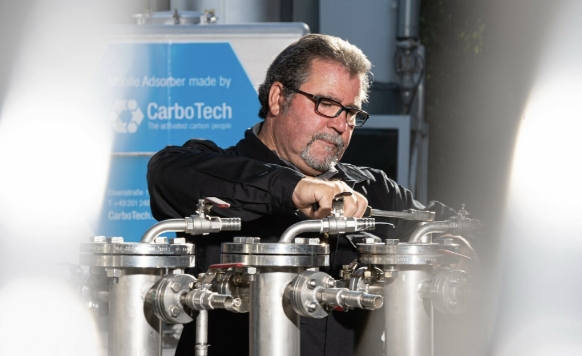- Service
- Nachhaltigkeit

- Aktivkohle
- Anwendungsgebiete
- Anwendungsgebiete
- Luft- und Gasreinigung

- Wasser- und Abwasserreinigung
- Lebensmittel

- Flüssigkeitsbehandlung
- Wasserstoffreinigung
- Kohlenstoffmolekularsiebe
- Individuelle Anwendungen

- Lösungen
- Über uns
- Neuigkeiten
Stichwort-SucheKontaktieren Sie uns!Unsere Experten finden die optimale Lösung für Ihr Anliegen.

Labore
- Startseite
- Lösungen
Labore
Die Reinigungsleistung unserer Aktivkohle ermitteln wir in unseren eigenen Laboren. Denn nur mit ihrer Hilfe ist die Einhaltung von definierten Eigenschaften gewährleistet. Gerade bei neuartigen oder komplexen Aufgaben für die Gas- und Flüssigphase ist die Prüfung im Labor wichtig. So können wir etwa feststellen, ob noch weitere Stoffe per Imprägnierung aufgetragen werden müssen.
Dabei ermitteln wir die Effektivität und den Nutzen der adsorptiven Reinigung mit Aktivkohle. So können wir ein qualitativ hochwertiges und effizientes Produkt garantieren. Hier hilft uns die 60-jährige Erfahrung im Bereich Aktivkohle.
WIR TESTEN IHRE AKTIVKOHLE
Mehr noch: Auf Wunsch bestimmen wir für Sie auch die Reinigungsleistung und Beladungskapazität Ihrer bisherigen Aktivkohle. Auch wenn Sie diese bei anderen Lieferanten bezogen haben. Entspricht die Qualität Ihren Vorstellungen? Mit unserer Hilfe finden Sie es heraus – bei Bedarf machen wir Ihnen zudem ein attraktives Angebot für den Austausch gegen unsere Produkte. Die Entsorgung der „alten“ Aktivkohle übernehmen wir für Sie gleich mit.
Nehmen Sie Kontakt mit uns auf, wir kümmern uns gerne um Ihr Anliegen.
Wir testen nach folgenden aktuellen ASTM Aktivkohle-Standards, Leitfäden und Praktiken
- D 2652-94 (1999) Standard Terminology Relating to Activated Carbon
- D 2854-96 (2000) Standard Test Method for Apparent Density of Activated Carbon
- D 2862-97 Standard Test Method for Particle Size Distribution of Granular Activated Carbon
- D 2866-94 (1999) Standard Test Method for Total Ash content of Activated carbon
- D 2867-99 Standard Test Method for Moisture in Activated Carbon
- D 3466-76 (1998) Standard Test Method for lgnition Temperature of Activated Carbon
- D 3467-99 Standard Test Method for Carbon Tetrachloride (CTC) Activity of Activated Carbon
- D 3802-79 (1999) Standard Test Method for Ball-Pan Hardness of Activated Carbon
- D 3803-91 (1998) Standard Test Method for Nuclear Grade Activated Carbon
- D 3838-80 (1999) Standard Test Method for pH of Activated Carbon
- D 3860-98 Standard Practice for Determination of Adsorptive Capacity of Activated Carbon by Aqueous Phase Isotherm Technique
- D 4069-95 (1998) Standard Specification for lmpregnated Activated Carbon Used to Remove Gaseous Radio-lodines from Gas Streams
- D 4607-94 (1999) Standard Test Method for the Determination of lodine Number of Activated Carbon
- D 5029-98 Standard Test Method for Water Solubles in Activated Carbon
- D 5158-98 Standard Test Method for Determination of the Particle Size of Powdered Activated Carbon by Air Jet Sieving
- D 5159-91 (1997) Standard Test Method for Dusting Attrition of Granular Activated Carbon
- D 5160-95 (1998) Standard Guide for Gas-Phase Adsorption Testing of Activated Carbon
- D 5228-92 (2000) Standard Test Method for Determination of the Butane Working Capacity of Activated Carbon
- D 5742-95 (2000) Standard Test Method for the Butane Activity of Activated Carbon
- D 5832-98 Standard Test Method for Volatile Matter Content of Activated Carbon Samples
- D 5919-96 (2001) Standard Practice for the Determination of Adsorptive Capacity of Activated Carbon by a Micro-lsotherm Technique for Adsorbates at ppb Concentrations
- D 6385-99 Standard Test Method for Determining Acid Extractable Content in Activated Carbon by Ashing
- D 6586-00 Standard Practice for the Prediction of Contaminant Adsorption on GAC in Aqueous Systems Using Rapid Small-Scale Column Tests
- D 6646-01 Standard Test Method for Determination of the Accelerated Hydrogen Sulfide Breakthrough Capacity of Granular and Pelletized Activated Carbon
- D 6647-01 Standard Test Method for Determination of Acid Soluble lron via Atomic Absorption
- Nachhaltigkeit